Can’t choose between visiting Vancouver Island or the Canadian Rockies? You don’t have to!
This two-week BC Coast and Rockies road trip route showcases both ocean and mountain regions as well as lush temperate rainforest and dry grasslands.
Expect to see turquoise lakes, deep canyons, gorgeous sandy beaches, huge waterfalls and more. There’s a chance to see bears, whales and bald eagles too.

Living in British Columbia for 10+ years now, JR and I have explored this province’s highways and hiking trails pretty extensively.
We can totally understand why visitors have trouble deciding between Vancouver Island and the Rockies. For the same reason, we live in the middle of British Columbia! Like this road trip itinerary, we get the best of both worlds.

This detailed post includes a day-by-day overview of the entire two-week BC Coast and Rockies road trip route as well as planning tips to help save you money (and stress!) along the way.
Here’s what to expect:
This post includes affiliate links. If you make a purchase or booking through one of these links, we may receive a small percentage of the sale. All prices in this post are Canadian dollars.

Feeling overwhelmed planning your dream Rockies trip?

Our Vancouver to the Rockies Travel Guide features 350+ of the best things to do, travel tips and more.
The itinerary builder tool will help you create your perfect Rockies adventure!
Request a review or a customised itinerary tailored to your interests (extra fee)
Download the app and use offline while travelling!

2 Week BC Coast and Rockies road trip overview
Time to start planning a BC Coast and Rockies road trip! This section of the guide provides an overview of the itinerary with a map and some important need-to-know information.
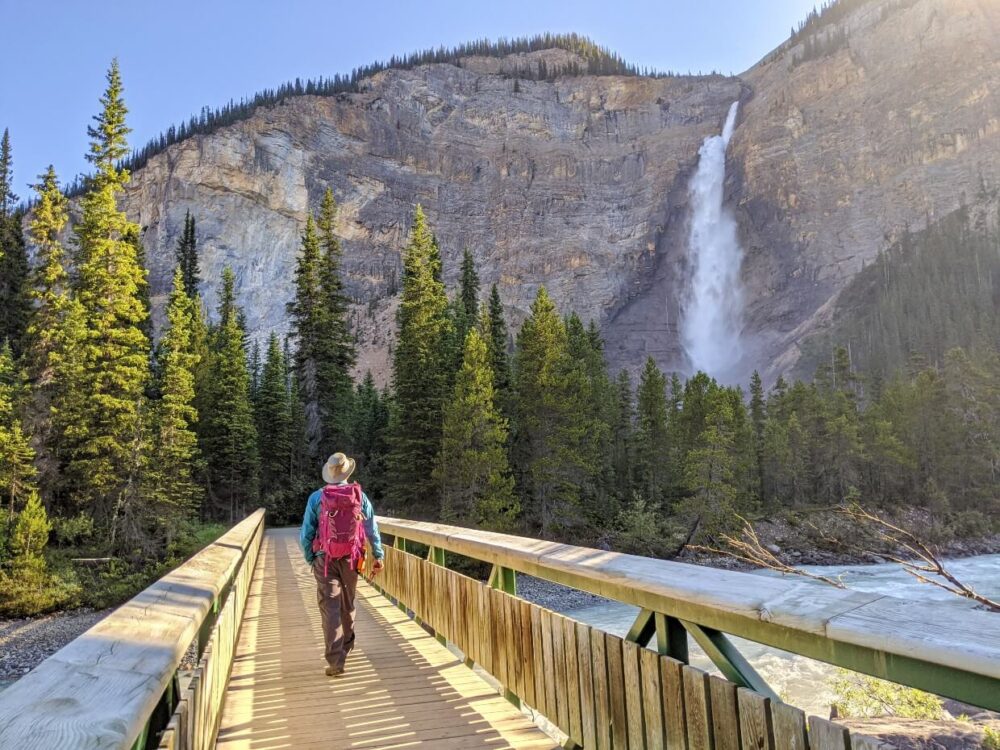
Road trip itinerary at a glance
Let’s take a look at an overview of this 2 Week BC Coast and Rockies road trip route from start to finish:
Day 1: Vancouver
Day 2: Vancouver to Victoria
Day 3: Victoria
Day 4: Victoria to Tofino
Day 5: Tofino
Day 6: Tofino to Parksville
Day 7: Parksville to Whistler
Day 8: Whistler to Salmon Arm
Day 9: Salmon Arm to Revelstoke
Day 10: Revelstoke to Golden
Day 11: Golden to Banff
Day 12: Banff
Day 13: Banff
Day 14: Banff to Calgary
If this routing sounds too fast for you or involves too much driving, I suggest looking at the alternative itineraries section at the bottom of the post.
2 Week BC Coast and Rockies road trip map
Use the below Google Map for orientation and planning.
Each of the suggested activities is marked on the map, with suggested accommodations in each town and city.

Need to know info
- This BC Coast and Rockies itinerary has been crafted in such a way as to reduce large driving blocks and take advantage of the best en-route activities
- While it is possible to explore this road trip route in either direction, I have written it from west to east for a few reasons. One significant factor is the ferry crossing on day 7, which occurs early in the day when driving from west to east
- The best time to drive this road trip is July to September. June can also be a good time, though some activities and trails in the Rockies will have limited accessibility at this time
- This itinerary is relatively fast-paced. If you choose to do most of the activities listed, you will not have a lot of downtime. Expect to be busy all day from breakfast until dinner
- If you know that you will need more downtime, stretch this itinerary over a longer period or skip some of the activities/stops
- The route and suggested activities are aimed at people who enjoy exploring nature and being active while on vacation
- Keep in mind that this 2 Week Coast and Rockies road trip route offers just a taste of local activities and trails. I have not mentioned every single possible activity as it is impossible to do everything!
- A national park pass is required to visit or camp in the national parks mentioned in this post (provincial parks are free)
- Before you leave home, I would suggest learning at least the basics concerning how to avoid negative bear encounters and also some outdoor safety. If you see a bear while driving, stay in your vehicle!
- When exploring BC, be sure to always Leave No Trace (dispose of trash properly, stay on established trails, don’t feed wildlife)
- More tips and advice in our BC trip planning guide

Day-by-day 2 Week BC Coast and Rockies road trip guide
Read on to discover a detailed breakdown of this two-week BC Coast and Rockies road trip itinerary, including where to stay and what to do each day.
Day 1: Vancouver
Surrounded by temperate rainforest, mountains and ocean, Vancouver boasts remarkable natural beauty.
The downtown area is relatively compact, though there are good public transport links to surrounding areas. The SkyTrain is particularly convenient for travelling between the airport (YVR) and downtown.
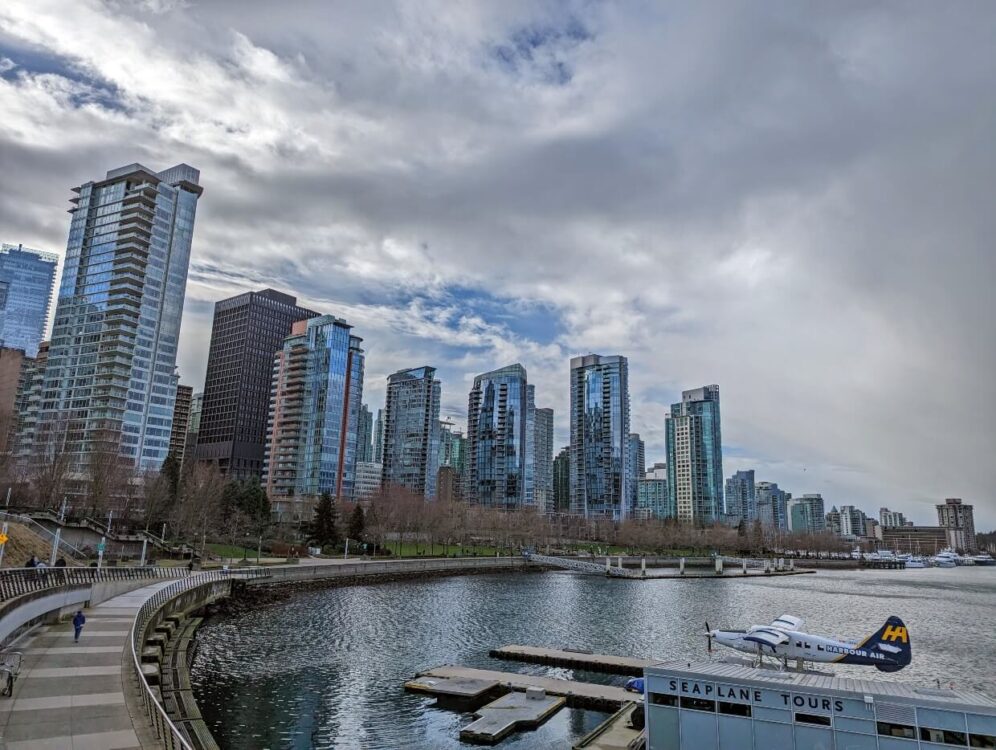
Things to do in Vancouver
- A single day doesn’t offer much time to explore Vancouver. Depending on how far you’ve travelled to reach the city, it might be wise to approach this day in a relaxed way, without trying to cram in too many activities or sights
- The Vancouver Seawall encircling Stanley Park is one of Vancouver’s most unique features. Consider renting a bike to explore the whole route or just stroll along a portion of it
- The Granville Island Public Market is a beloved destination for both tourists and locals alike. Make sure to arrive with an appetite
- Of course, a stroll around downtown is a must-do. Gastown is Vancouver’s oldest neighbourhood and features cobblestone streets, galleries, cafes and boutiques
Where to stay in Vancouver
Budget
Full disclosure here – it is difficult to find low-cost summer accommodation in Vancouver. The YWCA Hotel is one of the best value options. The cheapest rooms have shared bathrooms
Mid-range
The Moda Hotel is definitely my top pick in Vancouver. We’ve stayed several times and love the central location. The King rooms are spacious but even the smaller ones have everything you need
Luxury
For the most comfortable stay in Vancouver, consider the Fairmont Pacific Rim. The palatial suites have incredibly scenic views of the harbour and surrounding mountains

Day 2: Vancouver to Victoria
Driving distance: 115km
Driving time without activities: 3 hours plus ferry waiting time
And now the adventure truly begins. There are quite a few different ways to reach Victoria from Vancouver. The most direct ferry route is from Tsawwassen to Swartz Bay.
- Cheapest: Travel to the Tsawwassen ferry terminal on public transport and then take the bus into Victoria (around $30 per person, allow 4 hours)
- More comfortable budget option: Take the Wilson’s BC Ferries Connector bus, which picks up at major Vancouver hotels and drops off in downtown Victoria (around $105 per person, allow 4 hours, note baggage limits)
- Alternative option: Take a taxi to the Tsawwassen ferry terminal, cross to Swartz Bay, and taxi to Victoria (around $200 for two people, allow 4 hours)
- Drive your own vehicle: Pick up a vehicle rental and drive to Tsawwassen ferry terminal, drive to Victoria ($150 for two people, standard vehicle and reservation, allow 4.5 hours)
- Most luxurious: Catch a seaplane flight from downtown Vancouver to downtown Victoria ($250 minimum per person, 45 minutes, note baggage limits)
Before making any decisions, however, please check vehicle rental prices first. One-way rentals can be very expensive.
In my research, I found Victoria to Calgary vehicle rentals to be significantly cheaper than Vancouver to Calgary ($500-800 less). Depending on your requirements, this may not be the case for you.
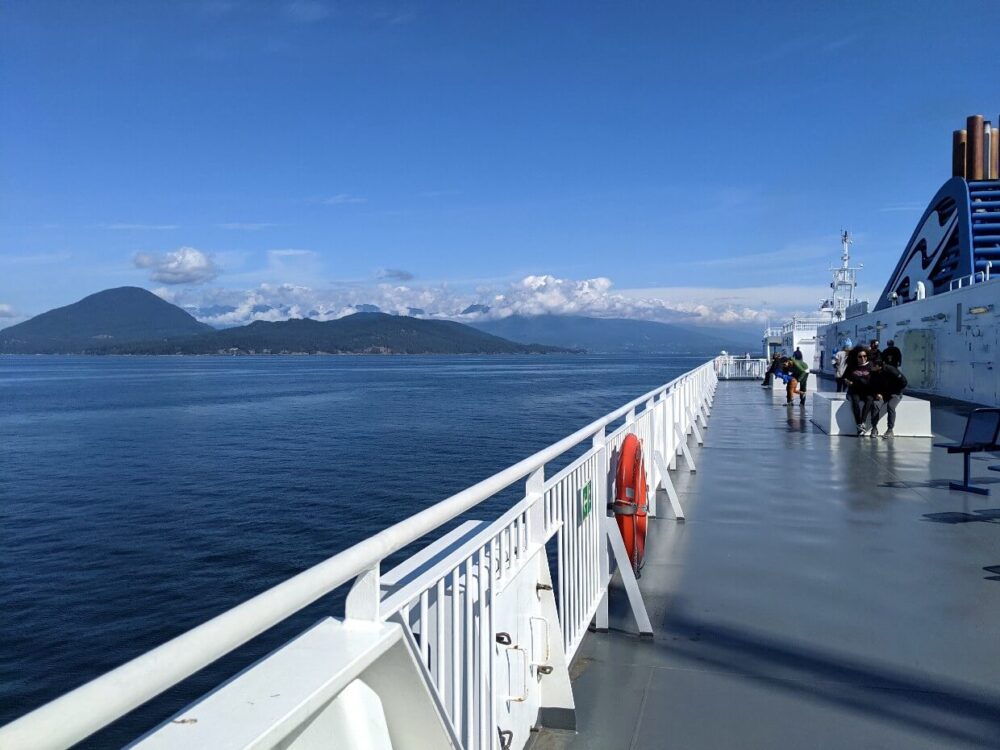
If you choose not to pick up a rental vehicle until Victoria, this can save both money and stress.
Navigating Vancouver traffic and the ferry loading process can be difficult, especially if you’re struggling with jet lag.
For all of the above options, I would highly recommend reserving ferry and other transportation tickets in advance.
For the best things to do in Victoria, check out the day 3 description below.
Where to stay in Victoria
Budget
We stayed at the Ocean Island Inn on our very first visit to Victoria. This well-priced hostel is in a great central location and there is a good mix of rooms (some private)
Mid-range
The Royal Scot Hotel & Suites is almost next door to the Legislature building (super walkable to everywhere). This hotel is particularly good for larger groups and families
Luxury
Of course, the most impressive place to stay in Victoria is the Fairmont Empress Hotel. This legendary property is right on the harbour, with some rooms offering direct views

Day 3: Victoria
Victoria is located on the southern tip of Vancouver Island and is British Columbia’s capital city.
Set around a picturesque inner harbour and featuring elegant colonial architecture, Victoria is one of the most beautiful cities around.
Victoria isn’t a place stuck in the past, however, with the downtown streets hosting hip cafes, boutiques and pubs
Best things to do in Victoria
- The BC Legislature Building is one of Victoria’s most iconic buildings. Explore the beautiful grounds or take a tour of the interior. Alternatively, join a historical tour of Victoria
- Can’t wait for Tofino to see whales? Join a whale watching tour from Victoria’s inner harbour! There is the potential to see orcas as well as humpback whales. Choose between a Zodiac or regular boat tour
- Treat yourself to afternoon tea at the elegant Fairmont Empress Hotel. It may not be a cheap activity but it’s a one-of-a-kind Victoria experience
- Take a walk to Fisherman’s Wharf (15-20 minutes), a floating village located on the Inner Harbour. It’s a great place to browse and eat fish and chips. There is a water taxi service as well
- For a lot of visitors, colourful Butchart Gardens is a must-see while in Victoria. A shuttle service is available from downtown or it is also possible to visit as part of a Victoria sightseeing tour
- For something a little more active, consider a guided kayaking tour of the harbour
Not interested in visiting Victoria? Nature lovers may want to skip this city and prioritise visiting another area of Vancouver Island. I’ve shared some alternatives in a later section of this guide.

Day 4: Victoria to Tofino
Driving distance: 317km
Driving time without activities: 4 hours 15 minutes
Today is the day to head to Vancouver Island’s wild West Coast. There is a lot to see on this journey! Plan to start early and spend around 7-8 hours travelling with half a dozen stops.
If you plan to pick up a vehicle rental in Victoria, allow some extra time in the morning for the check-out process.

Things to do between Victoria and Tofino
- Heading north, Highway 1 climbs and descends the 356m high summit of Malahat Mountain. Several viewpoints provide vistas of Saanich Inlet, the Saanich Peninsula, Salt Spring Island and the surrounding Salish Sea (10 minutes)
- Consider taking a detour to see one of the tallest free-standing timber rail trestle structures in the world – the Kinsol Trestle. It soars 44m above and 187m across the Koksilah River. The 2.5km return walk is very flat (allow 1.5 hours)
- For lunch, head to Cowichan Bay (colourful cafes and buildings on stilts) or Ladysmith (historic downtown)
- Closer to Nanaimo, make a quick stop at the roadside Petroglyph Provincial Park. There are a significant number of First Nation rock art carvings (petroglyphs) to see

- Turning onto Highway 4, the route is less busy but also much more twisty and narrow from here on
- Try to park at Cathedral Grove to see massive old-growth trees. It’s a busy place, so don’t panic if you can’t find a spot. You’ll get another chance on the way back
- Port Alberni is the largest service centre in this area. If you need to pick up groceries or supplies, do it here. Top up on gas as well. The phone signal is patchy after this point
- Highway 4 follows the edge of Sproat Lake before winding through several river valleys. If you need a break, head to Taylor River Rest Area. There is river access for swimming
- About 14km after the rest area is Wally Creek, also known as the Kennedy River Cascades. This rocky area features huge boulders smoothed by erosion
- The road starts to get very windy after this point. Eventually, you’ll reach the Tofino / Ucluelet junction. Turn right for Tofino
Where to stay in Tofino
For more information on where to stay in Tofino, check out our dedicated guide with tried and tested recommendations.
Budget
Green Point is the only vehicle-accessible campground located in Pacific Rim National Park (other options are available in Tofino). The campsites are set in the forest above the beach. Competition for campsite reservations is fierce
Mid-range
Ocean Village‘s distinctive ‘beehive’ cabins sit right behind Mackenzie Beach, offering breathtaking perspectives of crashing waves and sunsets. Adventurous hikers can walk into Tofino from here
Luxury
Tofino is well known for its luxurious beachfront resorts, such as Middle Beach Lodge (adults only) and Pacific Sands Beach Resort (dreamy floor-to-ceiling windows beach houses)
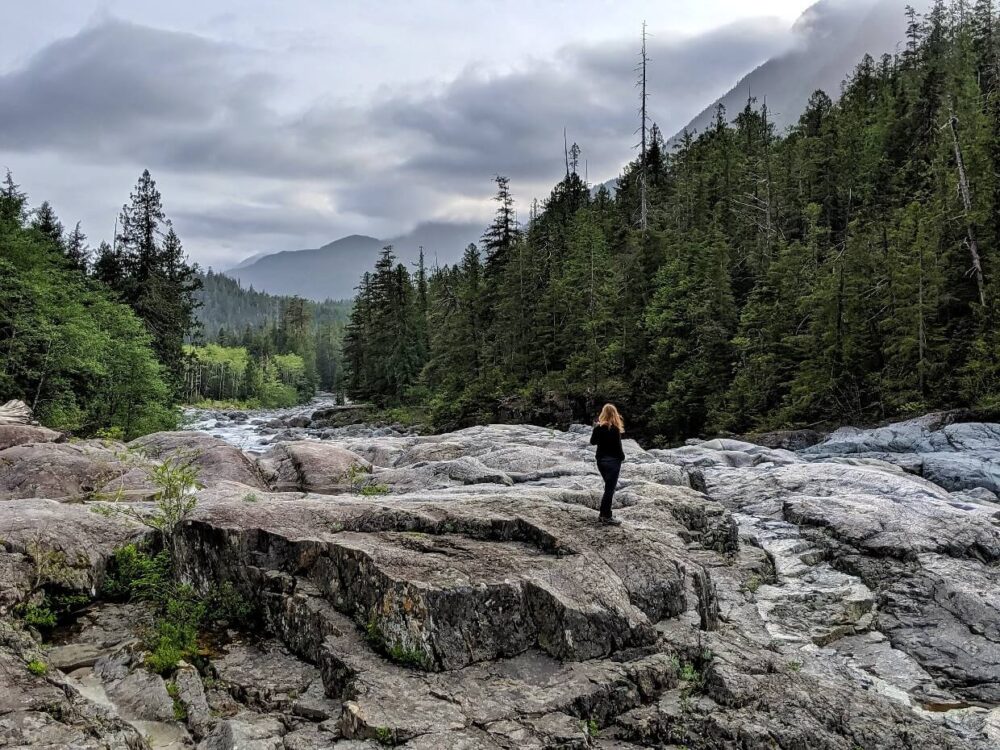
Day 5: Tofino
The small village of Tofino (pop. 2500) is perched on the very western edge of Vancouver Island. It is a gateway to natural coastal beauty characterised by long sandy beaches, old-growth temperate rainforest, misty mountains, rocky headlands and pounding surf.
Pacific Rim National Park protects a swathe of the coastline. This includes Long Beach, an appropriately named 16km stretch of golden sand backed by ancient forest.

Things to do in Tofino
- Have time for just one guided tour while in Western Canada? Let it be a whale-watching trip in Tofino! There is the chance to see grey whales, orcas, humpbacks, sea otters and more. Be sure to reserve in advance
- For lunch, consider braving the line (which does disappear pretty fast) to get takeout at the legendary Tacofino truck. Alternatively, enjoy your meal with a view at the Pointe Restaurant at the Wickaninnish Inn (we saw dolphins here)
- In the afternoon, take a walk on one of the many spectacular local beaches – my favourites are Cox Bay, Long Beach (national park pass required) and Florencia Bay (pass required)
- Feel like a short hike? There are so many options in and around Tofino!
- Whatever you do, be sure to plan your day so you can watch the sun disappear behind the ocean. Head to any beach!

Day 6: Tofino to Parksville
Driving distance: 170km
Driving time without activities: 2 hours 30 minutes
Though some people may choose to drive all the way to Whistler in one day from Tofino, I would suggest stopping overnight in the Parksville area instead.
There are several reasons for this, with the first being that there are just so many great places to see between Tofino and Parksville. Second, this allows for an early departure on the ferry on day 7.
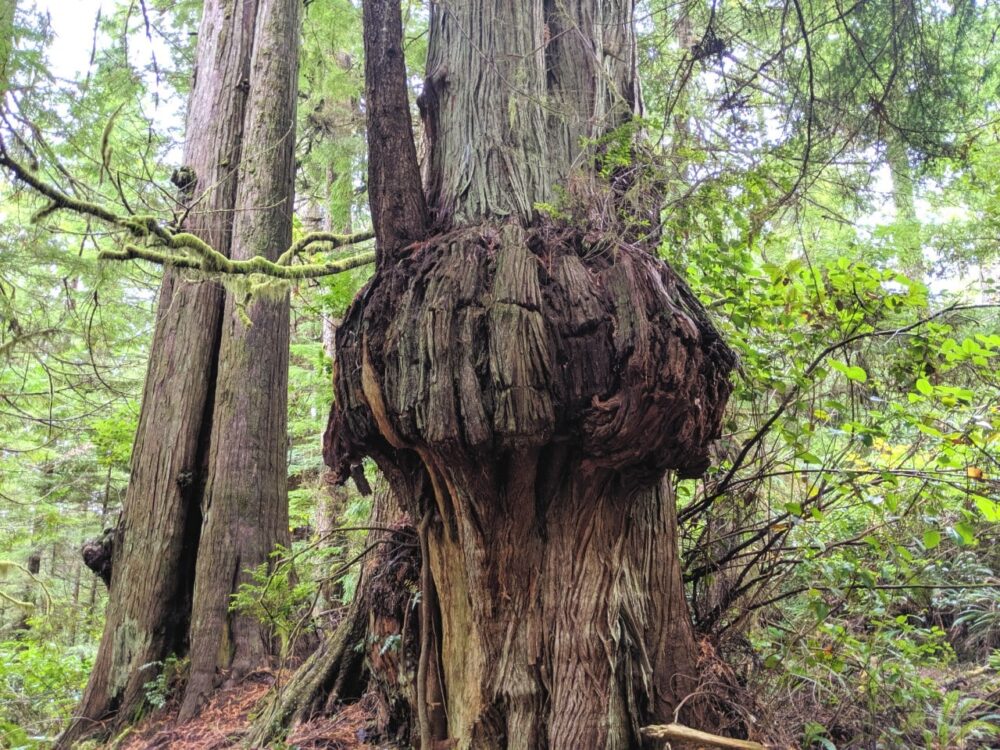
Things to do between Tofino and Parksville
- Start your day with a side trip to Ucluelet (20km return from Highway 4 junction). Tucked into a calm inlet, this small community has a less touristy feel than Tofino and is quieter too
- The Wild Pacific Trail is Ucluelet’s premier walking path, showcasing where the temperate rainforest meets the ocean. I’d recommend walking the 2.6 km Lighthouse Loop
- On the way back to the Highway 4 junction, check out the 15-20 minute Ancient Cedars Loop Trail. For such low effort, the rewards are surprisingly high with large 800+ year-old cedar trees appearing next to the trail almost immediately
- More petroglyphs can be viewed in Sproat Lake Provincial Park near Port Alberni. The 600m walk to the floating platform in front of the lakeside petroglyphs is almost completely flat
- On the other side of Port Alberni are Cathedral Grove (second chance to stop) and Little Qualicum Falls. A 3.2km loop trail showcases a series of waterfalls rushing through a dramatic, mossy gorge
- If waterfalls are your thing, make a detour to see Englishman River Falls. There is a 1.7km loop with two different viewpoints of the rushing river
- Finish your day with a trip to Rathtrevor Beach Park. This long beach is a mix of golden sand and pebbles and is breathtaking at any time of the year.
More details on these must-see places can be found in our detailed Nanaimo to Tofino road trip guide.
Where to stay in Parksville
Budget
Rathtrevor Beach is one of BC’s most popular campgrounds and it’s easy to see why, with 250 spacious sites set under an old-growth forest canopy, all a short walk from the beach. Reservations are absolutely essential in summer
Mid-range
Highly rated on Booking.com, the Tide’s Inn Motel is a convenient place for a stopover in Parksville. The nicely renovated property is close to the beach. Guests receive a free round of mini-golf
Luxury
Sunrise Ridge Waterfront Resort is a great choice, with beautifully modern condo-style suites just steps away from the beach. The resort is set on 10 acres of land and boasts a pool and hot tub

Day 7: Parksville to Whistler
Driving distance:
Driving time without activities:
Back to the mainland! It is an easy 35 minute (37km) drive from Parksville to the ferry in Nanaimo. The Departure Bay Terminal is the most convenient for Whistler.
As previously mentioned, I would highly recommend having a reservation to ensure you have a spot on a specific ferry crossing. Plan for an early sailing to make the most of the day (10-11am).
Be sure to arrive at the terminal within the time stated on your ferry reservation confirmation (usually 60 to 30 minutes before departure). The ferry crossing takes 1 hour 40 minutes.
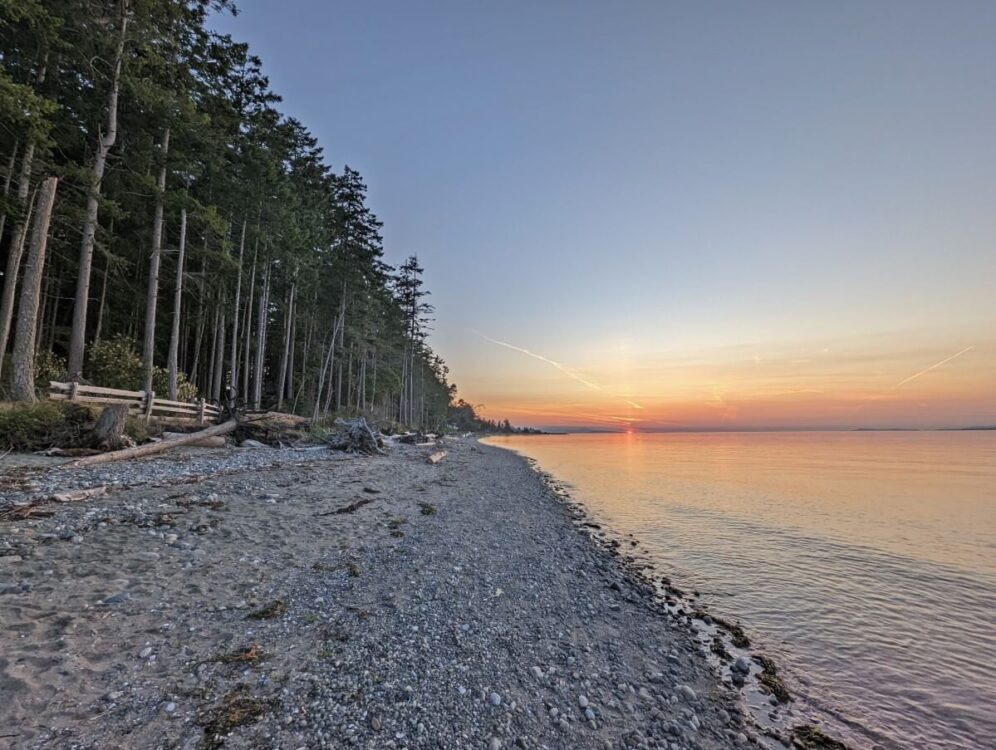
Things to do between Parksville and Whistler
- Travelling alongside Howe Sound, an ocean fjord, and between huge mountain ranges, the Sea to Sky Highway (99) is wonderfully scenic
- Porteau Cove is an ideal first stop to stretch and get your bearings. Enjoy the ocean views and take a walk on the pier
- Shannon Falls is one of BC’s highest waterfalls (335m). The first viewpoint is situated just a five-minute walk from the parking lot
- If you’re curious about what lies at the top of the mountains above the highway, take the Sea to Sky Gondola to find out. Breathtaking vistas of the ocean and surrounding mountains await!
- The small town of Squamish is just a little further up the highway. The dramatic Stawamus Chief, a huge granite monolith, can be seen from downtown. Stop for a late lunch or to get food supplies
- Last stop before Whistler is Brandywine Falls. Allow 20-30 minutes to walk the easy 1km return trail to the viewpoint
- Cool off with a swim in Alta Lake in Whistler. Note that parking is limited so walk or take the bus if you can (#10, #20, #25 BC Transit buses)
- For something more active, consider the Whistler Train Wreck hike or Lost Lake
- In the evening, explore Whistler’s alpine-themed village and take a photo with the huge Olympic Rings
Where to stay in Whistler
Budget
The Pangea Pod Hotel is situated right in the heart of the action. For camping, head to Riverside RV Resort or Nairn Falls Provincial Park (north of Whistler)
Mid-range
Whistler Village Inn & Suites offers comfortable surroundings in a central but surprisingly quiet location. The Pinnacle Hotel is a good alternative
Luxury
Highly rated for the gorgeous property and spacious rooms, the Four Seasons is a particularly special place to stay in Whistler. There is a walking path to the village centre

Day 8: Whistler to Salmon Arm
Driving distance: 407km
Driving time without activities: 5 hours 15 minutes
Highway 99 continues beyond Whistler and through the spectacular Garibaldi Ranges.
The lush mountain scenery gives way to a contrasting, notably drier ecosystem in the latter part of the journey.
You’ll pass by the city of Kamloops located within British Columbia’s arid grasslands. The landscape here is quite different to anything else you will see on this BC Coast and Rockies road trip.
The day concludes in Salmon Arm, an approachable small city on the shores of expansive Shuswap Lake.
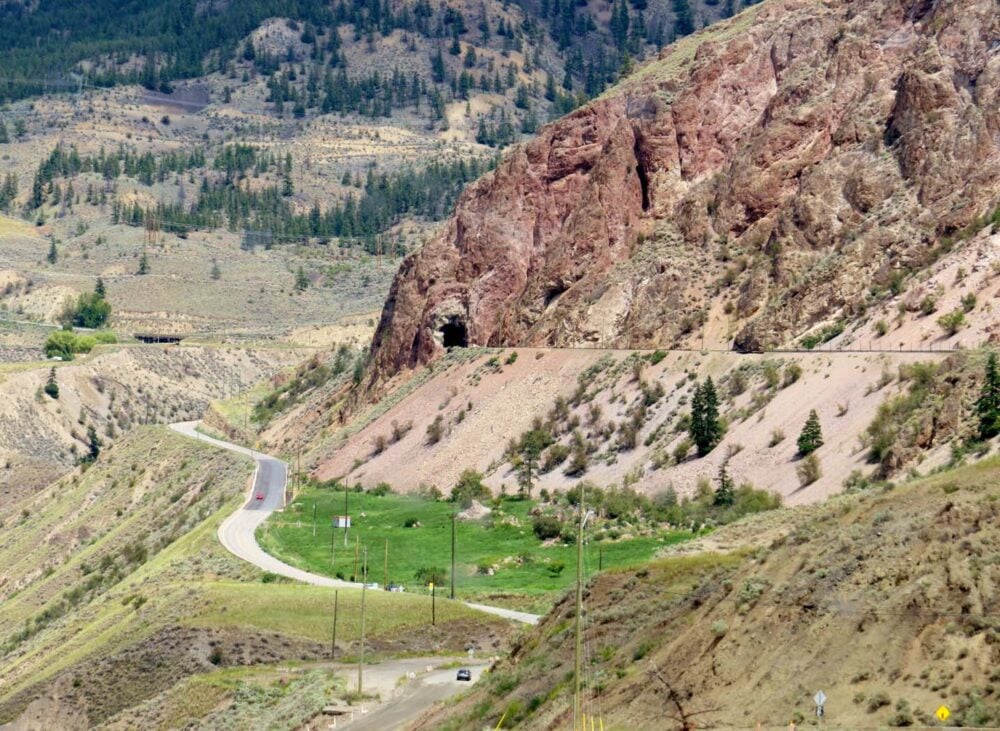
Things to do between Whistler and Salmon Arm
- Nairn Falls, located 25 minutes north of Whistler, is a must-see attraction. The viewpoint is accessible via a 3km round-trip hike from the parking lot
- Enjoy morning coffee or lunch in Pemberton, a charming village surrounded by mountains
- Beyond Duffy Lake, the landscape starts to change dramatically. Stop in Lillooet to take it all in (pick up some treats from the bakery too!)
- There is a great viewpoint/rest area 30 minutes west of Kamloops
- Margaret Falls is a worthwhile detour just north of Salmon Arm. This tall waterfall is only a 10 minute walk from the parking lot. Sunnybrae Winery is worth a look on the way
- In Salmon Arm, DeMille’s Farm Market sells fresh produce from the Shuwap region throughout the summer months
- Take a walk along the wooden waterfront wharf in Salmon Arm – it’s North America’s longest. The views of the lake are gorgeous!
Where to stay in Salmon Arm
Budget
Herald Provincial Park has three different campgrounds, all on the shores of Shuswap Lake (15 minutes detour from Highway 1). Reservations are available four months in advance
Mid-range
Salmon Arm’s Comfort Inn & Suites is not downtown but is very convenient for the highway. Breakfast is included with every stay. Great value for money!
Luxury
For upscale lodgings in Salmon Arm, book a stay at the Prestige Harbour Resort. It is located on the waterfront, within walking distance of downtown. Spa, gym, indoor/outdoor pool

Day 9: Salmon Arm to Revelstoke
Driving distance: 104km
Driving time without activities: 1 hour 15 minutes
Don’t worry, this day involves a lot less driving than the previous one! The journey continues along the shores of Shuswap Lake before heading into the Monashees Mountains.
Revelstoke is your overnight stop, a cool yet still down-to-earth mountain town that has seen a lot of development over the last decade or so.
A real outdoor playground, Revelstoke also has a great community feel. After speaking to a few locals, you’re sure to learn how ‘stoked’ people are to live here!
If you have time to spend 2 nights in BC’s mountains, Revelstoke is a good choice. I have lots of ideas for other things to do in this dedicated Revelstoke post.
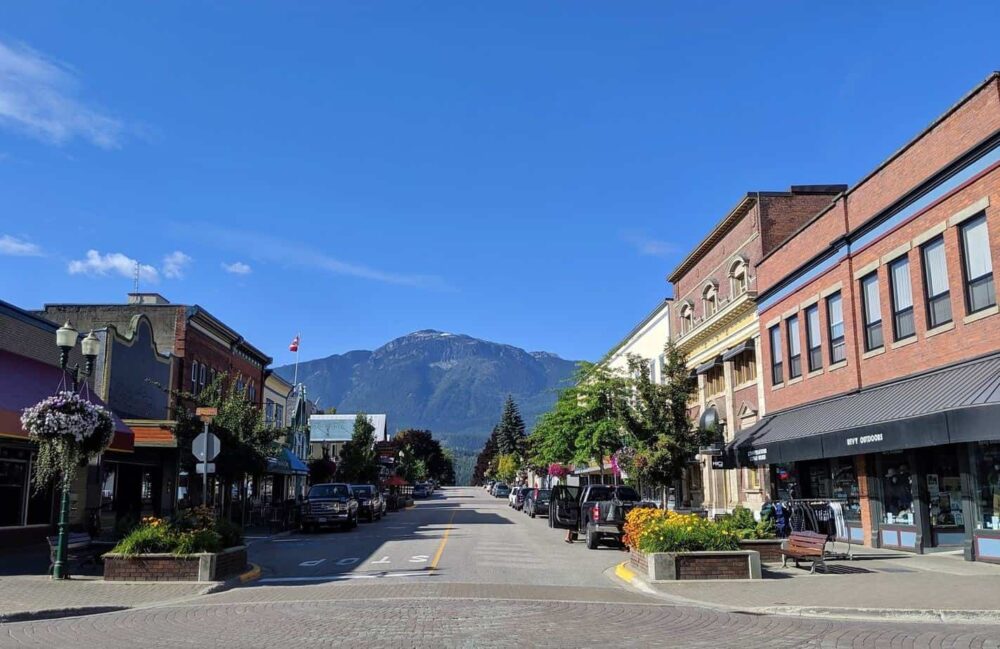
Things to do between Salmon Arm and Revelstoke
- For coffee, head to Blondies in Sicamous. This super cute cafe is just off Highway 1 and has a lovely shaded garden
- Next, drive up to the Sicamous Lookout. It’s a spectacular roadside viewpoint above the town with panoramic views of the lake and surrounding mountains. The road is unpaved but it is maintained well. Allow 45 minutes for the return trip.
- D Dutchmen Dairy is a farm farm on the east side of Sicamous. Stop here for homemade ice cream, cheese and milk. Be aware that it does get very busy around lunchtime
- One of our favourite stops between Sicamous and Revelstoke is the Last Spike, a historical site celebrating the completion of the railway connecting eastern and western Canada
- After arriving in Revelstoke, I’d suggest making the afternoon with a scenic drive on the 26km long Meadows in the Sky Parkway into the subalpine of Mount Revelstoke National Park (park pass required)
- Travelling with kids? You may want to prioritise visiting Revelstoke Mountain Resort instead, home of the 42km/h Pipe Mountain Coaster
- In Revelstoke, enjoy exploring the historic downtown area. It’s one of my favourite mountain towns in BC, with plenty of great shops and restaurants. The town is surrounded by the Monashee and Selkirk ranges
Where to stay in Revelstoke
Budget
Snowforest Campground in Mount Revelstoke Park is convenient for the Meadows in the Sky Parkway. Alternatively, try Martha Creek Provincial Park
Mid-range
We have stayed at the Swiss Chalet Motel several times. The property offers excellent value for families and larger groups. Basic breakfast included and the property is only 10-15 minute walk to downtown
Luxury
The stylish rooms at the historical Regent Hotel are surprisingly spacious. The complimentary breakfast buffet is the best I’ve had anywhere in Canada

Day 10: Revelstoke to Golden
Driving distance: 148km
Driving time without activities: 2 hours
Time to head further into the mountains! The surrounding valley slopes get steeper and steeper as the highway heads into Glacier National Park. Multiple snowsheds and tunnels provide avalanche protection for the road in winter.
Keen hikers will find plenty to do between Revelstoke and Golden. If not, plan to spend most of your day in Golden instead.
Like Revelstoke, Golden is a small town surrounded by mountains. In Golden’s case, the bordering ranges are the Selkirks and Purcells (the Columbia Mountains) and the Rockies.
Please note that there is a time zone change, from Pacific to Mountain Time, just beyond the eastern boundary of Glacier National Park. Prepare to lose one hour today.
There is also major construction in this area. We have often been stopped on the road for 30-40 minutes. There is no detour.
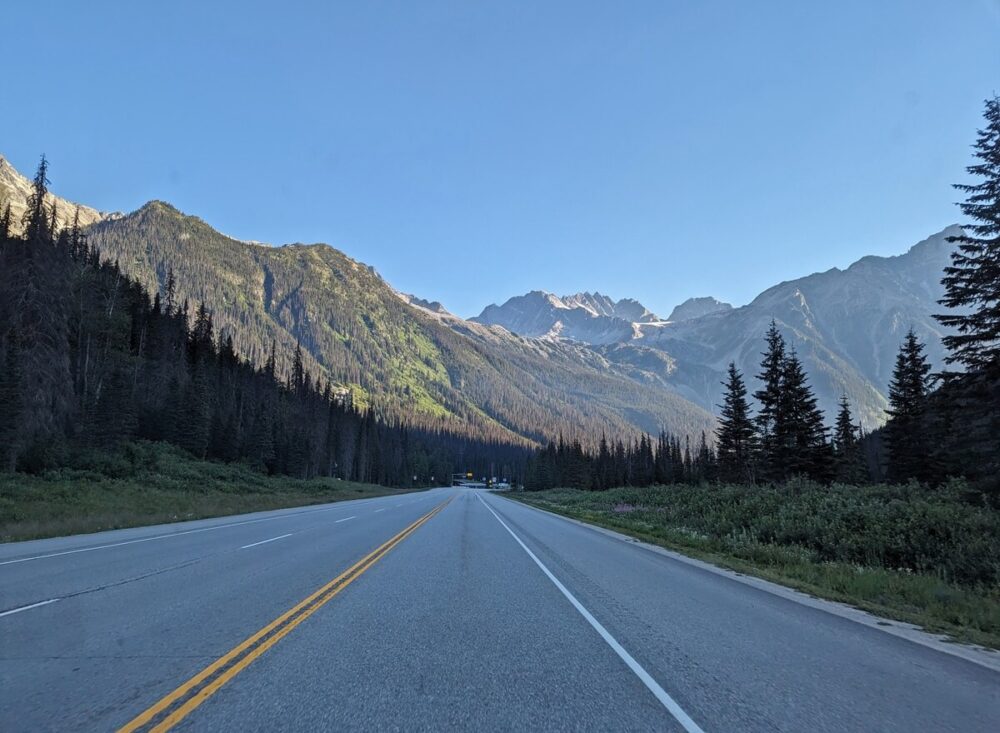
Things to do between Revelstoke and Golden
- Admire huge trees and beautiful forest on the Giant Cedars Boardwalk in Mount Revelstoke National Park
- Discover a taste of Glacier National Park on two short trails – Hemlock Grove Boardwalk (350m) and the Rockgarden Trail (430m)
- For a longer (but still easy) hike, head to the Meeting of the Waters Trail (3.3km loop, starts from the Illecillewaet Trailhead)
- Most of the other hikes in this area of the park are very steep and require most of the day to explore (such as the Glacier Crest Trail)
- The highest section of Highway 1 is at Roger’s Pass, with an elevation of 1327m. The free Discovery Centre here is well worth the stop
- Before leaving Glacier Park, consider the very short but steep hike to beautiful Bear Creek Falls (1km)
- If you do get into Golden early, consider heading east through town to Wapta Falls in Yoho National Park. The 3.2km return trail is mostly flat
- Families and thrill seekers may prefer to explore the Golden Skybridge, host to Canada’s highest suspension bridges, or the adventurous Via Ferrata course at Kicking Horse Mountain Resort.
Where to stay in Golden
Budget
The pleasant municipal campground backs onto the Kicking Horse River. An alternative is the Kicking Horse Campground in Yoho National Park
Mid-range
Golden has a plethora of motels and chain hotels to choose from, with popular options being the Holiday Inn and Ramada. We’ve stayed at the Ramada twice
Luxury
Moberly Lodge‘s quiet, spotlessly clean rooms are a welcome sight after a day on the road. Outside, there are stunning views and a hot tub, ideal for a relaxing end-of-the-day soak

Day 11: Golden to Banff
Driving distance (via Emerald Lake, Yoho Valley Road): 187km
Driving time without activities: 2 hours 45 minutes
Today is dedicated to exploring Yoho National Park, the most underrated park in the Rockies. It’s a little less busy than Banff but still has plenty to offer visitors.
Get ready to see some of the most spectacular natural wonders in British Columbia!
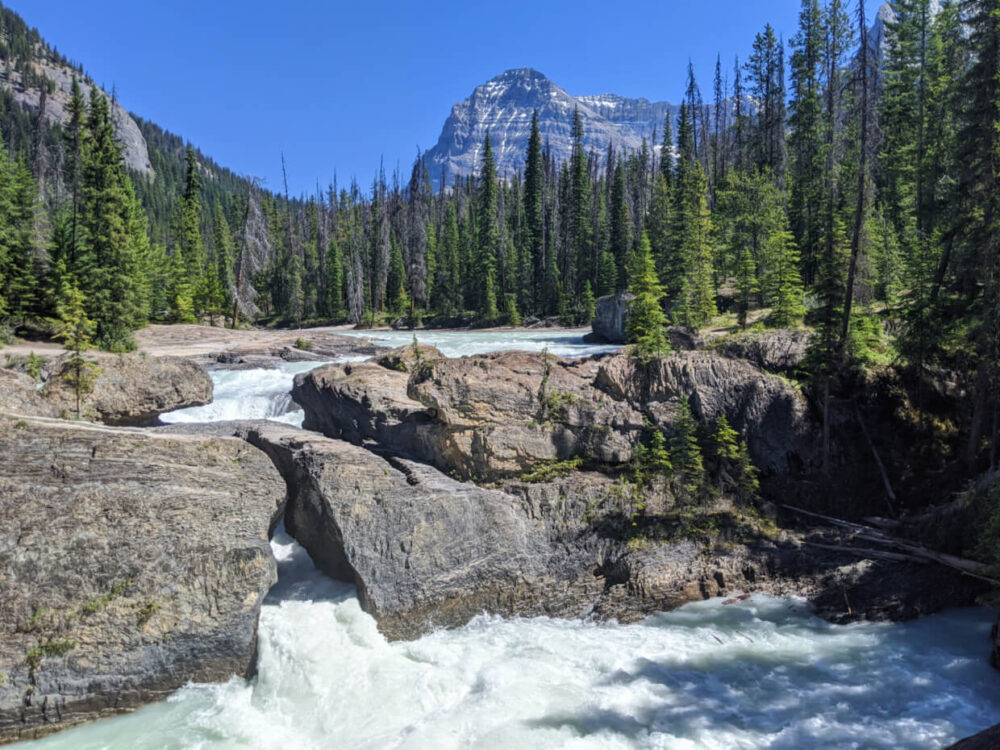
Things to do between Golden and Banff
- Head directly to Emerald Lake. It is just as beautiful as the name implies, with gorgeously turquoise water. Emerald Lake is the most popular place to visit in Yoho, so try to get here before 10.30am
- Enjoy the views at Emerald Lake, rent a canoe ($90/hour) or walk the family-friendly 5.2km loop trail around the lakeshore. Allow around 2 hours for the latter
- On the way back to Highway 1, make a stop at the Natural Bridge, where the mighty (and very cold!) Kicking Horse River has carved out a natural limestone bridge through erosion
- Consider grabbing lunch at the excellent Truffle Pigs in Field. They also have ice-cream
- After lunch, take a scenic drive on Yoho Valley Road. Please note that this road is open from late June until mid-October only and has no services or phone signal. There are several tight switchbacks – trailers and large RVs are not permitted
- Takakkaw Falls, British Columbia’s second-tallest waterfall, sits at the end of Yoho Valley Road (700m return to the best viewpoint area)
- If you have an additional day to spend in Yoho, I would highly recommend a full-day hike on the Iceline Trail or a Burgess Shale guided tour
- The Spiral Tunnel Viewpoint is the last stop in Yoho (and British Columbia!) Depending on timing, you may be lucky and see a train pass through this impressive structure
- Depending on the time, you may consider driving part-way up the Icefields Parkway as far as the Waterfowl Lake Viewpoint (100km return) via Peyto Lake and Bow Lake. This would free up time on another day
- If you have even more spare time, Kootenay National Park’s Marble Canyon (15 minutes drive) is well worth the detour
Where to stay in Banff
It’s no secret that Banff is not a cheap place to stay. If your budget doesn’t stretch to it, consider the nearby town of Canmore instead (still touristy but more of a local vibe, slightly lower prices).
Budget
Our preferred Banff campground for tent camping is Tunnel Mountain Village 1. The sites are relatively private and the campground is just a short bus ride away from downtown
Mid-range
We rate the Moose Hotel & Suites as one of the best places to stay in Banff (walking distance to everywhere, rooftop hot tub). Nearby Canmore has more mid-range options
Luxury
For a once-in-a-lifetime visit to Banff, consider the Fairmont Banff Springs or the Rimrock Resort. The latter has truly incredible views across Banff and the surrounding mountains

Day 12: Banff
There are so many different things to do in the picture-perfect mountain town of Banff and surrounding Banff National Park.
For many visitors, checking out spectacular Moraine Lake and Lake Louise is a priority. I’ve put them on the schedule for day 13. Of course, feel free to switch these days around to your own preferences.
I would recommend starting one of your full days in Banff with a trip to Johnston Canyon (32km, 35 minutes drive).
Suspended metal walkways provide secure passage through the deep gorge to a series of waterfalls. Johnston Canyon is usually very busy from 10am onwards so be sure to arrive at 9am or earlier.

Best things to do in and around Banff
- Drive the shores of Two Jack Lake and then cruise the Lake Minnewanka Scenic Drive (24km). Keep your eyes peeled for wildlife. Walk the shoreline trail or consider renting a canoe ($87/hour)
- The best free vehicle-accessible viewpoint is the Mt Norquay Lookout. It’s completely free and offers amazing vistas of Banff and surrounding peaks
- Thrill seekers will love the Via Ferrata course at Mt Norquay! The experience offers a safer way to experience climbing in the Rockies (and the views are AMAZING)
- Feel like a hike? The 2km uphill trail to the top of Tunnel Mountain is well worth the effort (300m elevation gain) as it ascends the slopes of this prominent landmark
- If that sounds like too much, reserve a spot on the Banff Gondola that ascends to the top of Sulphur Mountain. The views are simply spectacular. I’d recommend taking the bus (route 1) to avoid having to find parking at the gondola base
- Explore downtown Banff and enjoy the views of the surrounding mountains while browsing the wide range of shops
- If the shopping area doesn’t appeal, take a walk along the Bow River to see the falls. If you have the time, visit the Surprise Corner Lookout, which features views of the iconic Fairmont hotel

Day 13: Banff
It’s time to visit Banff National Park’s most famous lakes – Lake Louise and Moraine Lake. Please note that Moraine Lake is usually open from late May to early October only.
Since Moraine Lake is only accessible by bus and Lake Louise parking is very limited (and also $36/day!), there are three main options:
- Reserve the Parks Canada park-and-ride shuttle ($8/person) located at Lake Louise Ski Resort, 45 minutes drive from Banff. There are regular buses to Lake Louise and Moraine Lake, with a Connector Shuttle between them
- Reserve the 8X Roam Transit bus from Banff to Lake Louise Lakeshore ($10/person). This reservable express bus takes 55 minutes. The $25 Roam System Wide Pass includes access to the Parks Canada Lake Connector Shuttle to Moraine Lake
- Sightseeing tour or guided shuttle service from Banff that includes stops at Lake Louise and Moraine Lake. I’d recommend Banff Explorer (shuttle) or Discover Banff Tours (guided)
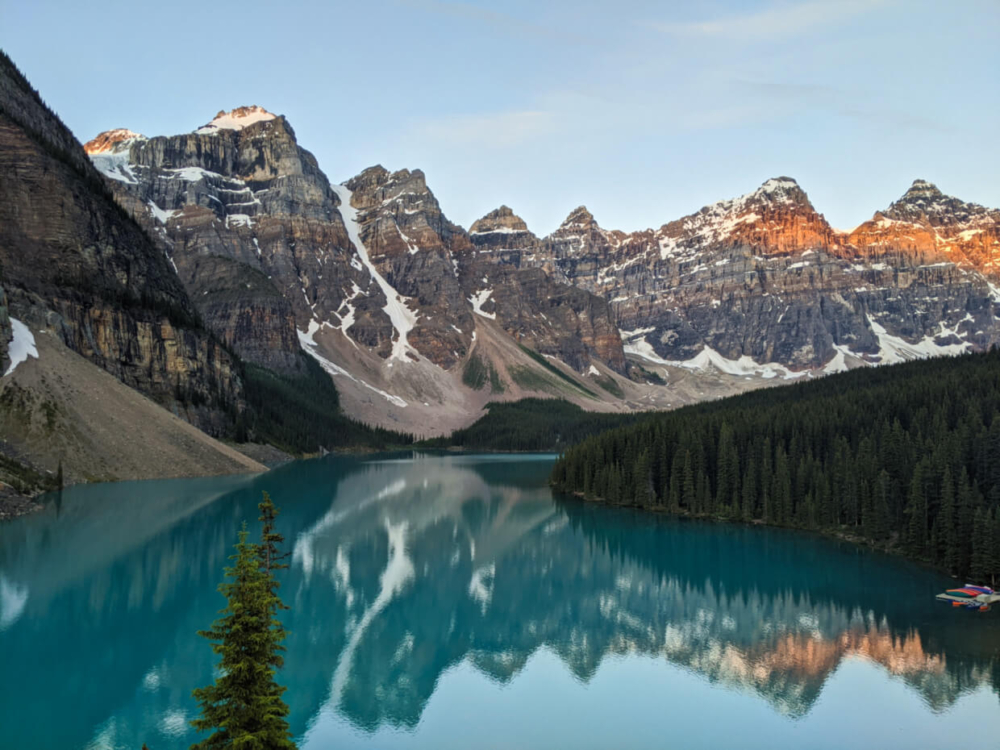
Things to do around Moraine Lake and Lake Louise
In addition to spectacular lakeshore views, both lakes have great hiking opportunities.
- Lake Agnes is a very popular destination from Lake Louise, 7.4km return with 390m elevation gain (allow 2 to 2.5 hours, note that it is uphill almost the entire way)
- For a longer hike near Lake Louise, choose between the Lake Agnes/Big Beehive/Plain of Six Glaciers Loop (18km with 900m elevation gain) or a summit of Mount Piran (13km return with 900m elevation gain)
- In the Moraine Lake area, consider the Consolation Lakes trail. Starting just past the Rockpile, this 5.8km return hike features views of high alpine meadows, mountain peaks and the Quadra Glacier
- Didn’t manage to visit Peyto Lake on day 11? Drive the first part of the Icefields Parkway today to check it out (along with Bow Lake)
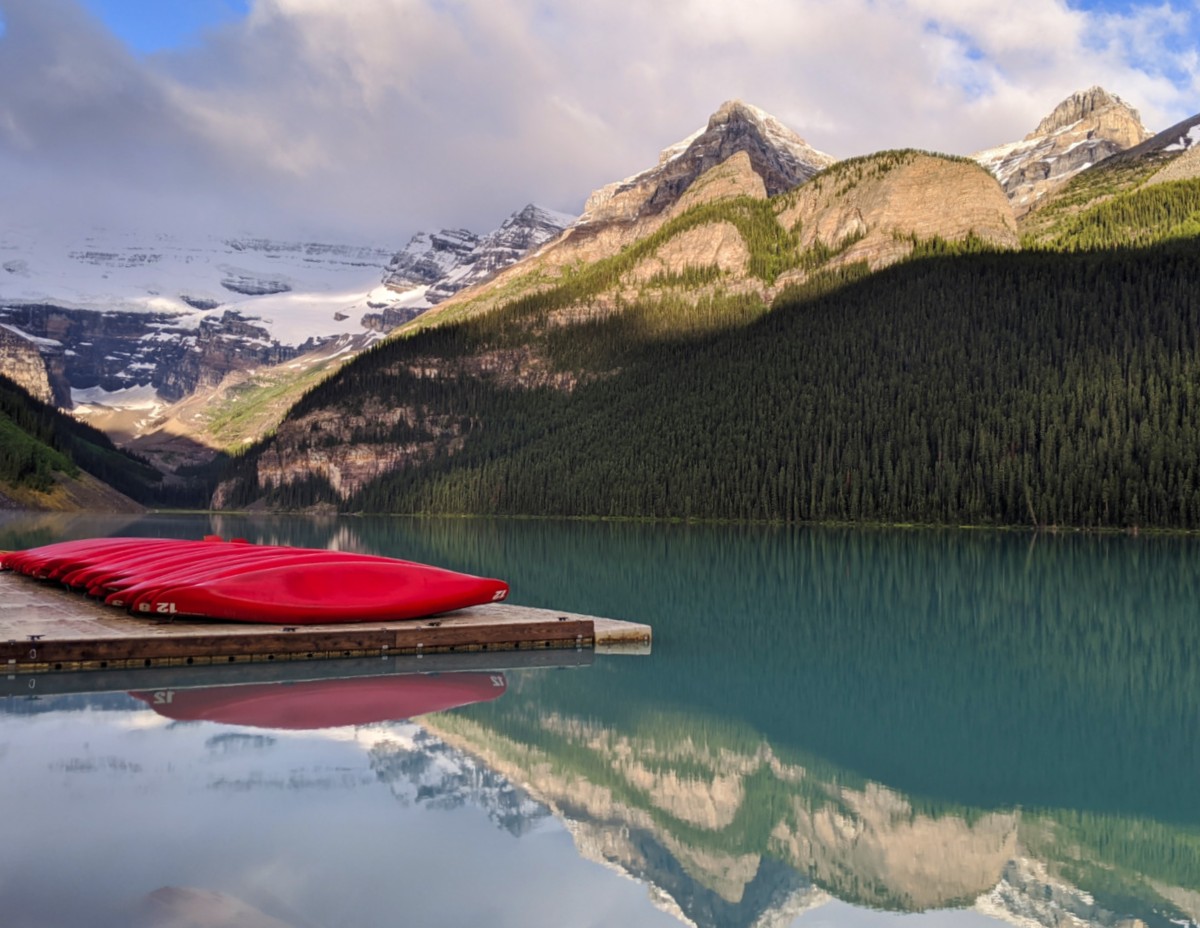
Day 14: Banff to Calgary
Driving distance: 137km
Driving time without activities: 1 hour 40 minutes
All good things must come to an end, including this epic 2 week BC Coast and Rockies road trip.
The drive to Calgary is straightforward and relatively short. It features some impressive mountain views as well.
Depending on your onward plans, there are many options for places to stop on the way to Calgary. Alternatively, you could spend the morning in Banff and explore more of this spectacular national park.

Things to do between Banff and Calgary
- Consider a stop in Canmore, another beautiful mountain town. There is a great choice of restaurants for lunch
- There are some excellent hiking trails within easy reach of Canmore. Grassi Lakes is one of our favourite short hikes in the area. Ha Ling Peak is a more challenging option
- Closer to Calgary, head to Winsport for some fun family-friendly activities. Kids will love the luge karting

2 week BC Coast and Rockies road trip: top tips
Before heading out on your trip, take note of the following advice:
Money saving advice
- This itinerary focuses on free activities over paid ones. I have, however, mentioned half a dozen paid attractions which I think offer one-of-a-kind experiences
- Gas is significantly cheaper in Alberta than in British Columbia, even in resort towns like Banff, Jasper and Lake Louise. Be mindful of where you gas up at the end of this road trip
- A national park pass is required to visit the Pacific Rim, Jasper, Banff, Yoho, Glacier and Revelstoke national parks. If you plan to spend seven or more days in the parks (very possible with this itinerary), a Discovery pass provides better value
- One-way car hire can be very expensive ($2000+ for a two-week trip). As mentioned in the post, consider taking the bus to Victoria and hiring a vehicle there instead. This also avoids having to drive in Vancouver
- If a one-way car hire proves too expensive, you’ll need to start and finish in the same location. Our two week Western Canada road trip begins and ends in Vancouver but doesn’t visit Vancouver Island
Camping details
The best way to save money while touring Western Canada is to camp.
- National park campgrounds (Parks Canada) average $30-50/night plus $11.50 reservation fee
- Provincial park campgrounds (BC Parks) average $20-40/night plus $6/night reservation fee
- Private campgrounds average $30-70/night
The downside is that you’ll need camping equipment. An alternative option is to rent an RV, so you can sleep in your vehicle.
It is possible to buy relatively cheap camping gear and accessories at Canadian stores like Walmart. A full set-up with an entry-level tent (4 person), sleeping bags (2), sleeping mats (2), stove and other essential supplies would cost around $500CAD.
The campgrounds mentioned in this itinerary are very popular and, as such, travellers should reserve well in advance.
- Reservations for vehicle-accessible national park campgrounds usually open in January for the following summer. The exact launch dates are usually revealed during the preceding December. Parks Canada reservation website
- Reservations for vehicle-accessible provincial park campgrounds in British Columbia operate with a four-month rolling window. So if you want to book for 7th August, the date will be available to book on 7th April. BC Parks reservation website
- Missed an important reservation? Check often for cancellations or use CampNab do the work for you
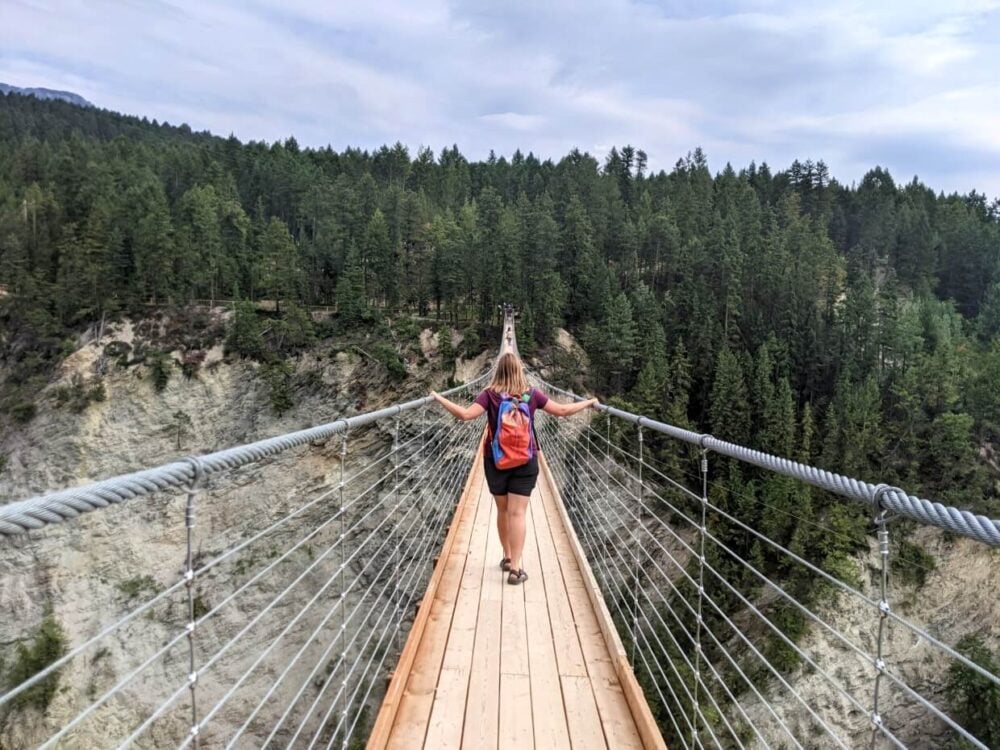
Alternative road trip itineraries
While we think this 2 week road trip itinerary provides a great overview of the BC Coast and Rockies, we realise that it may not be perfect for everyone.
It is easy to adapt the basic itinerary to suit your own preferences. This features some suggestions of how you can easily do that.
Nature focused 2 week BC Coast and Rockies road trip
If Victoria doesn’t sound like your cup of tea (we’re not huge city people either), consider focusing on the mid-Vancouver Island area only.
Take the ferry to Nanaimo instead, spend an extra night in Tofino and an extra night in Parksville.
Use the extra time in Parksville to drive up to Campbell River via Courtenay and Comox. This offers the chance to explore more beautiful beaches and waterfalls. There are some great hiking trails in this area as well.
2 week BC Coast and Rockies road trip without Whistler
There’s no getting around it, Whistler is not a cheap place to stay.
If it isn’t in your budget and/or Whistler just doesn’t interest you, it is possible to drive directly from Parksville to Kamloops in one day via Highway 1 or 5. It will be a long driving day (be sure to get an early ferry) but it would be a money saver. From Kamloops, you could then drive to Revelstoke the next day.
Doing this detour would mean missing the fabulous Sea to Sky drive. For details on the best things to see driving between Vancouver and Kamloops, check out our Highway 1 road trip guide.
With the extra night ‘saved,’ consider staying an additional night in Tofino or Revelstoke.
16 day Vancouver Island / Canadian Rockies road trip
If you have a few more days to play with, I’d highly recommend extending this road trip with a trip to Jasper in Alberta.
Jasper is a quieter (but still very popular), more northern version of Banff, located at the end of the spectacular Icefields Parkway.
The easiest way to do this is to add two (or even three) nights in Jasper after Golden. Visit a handful of places on the Icefields Parkway on the way up and then visit another half a dozen on the way down.
In Jasper, I would recommend visiting Maligne Lake (Spirit Island), Maligne Canyon and the Pyramid Lake area. Our Canadian Rockies road trip loop guide explains more about the best things to do in Jasper.

More planning resources
25+ Amazing Vancouver Island Waterfalls You Must Visit
The Best Hot Springs in BC: Complete Guide + Map
Where to Find Big Trees on Vancouver Island
Campbell River to Port Hardy Road Trip Guide: Best Places to Stop
Where to See the Salmon Run in British Columbia

One half of the Canadian/British couple behind Off Track Travel, Gemma is happiest when hiking on the trail or planning the next big travel adventure. JR and Gemma are currently based in the beautiful Okanagan Valley, British Columbia, Canada. Consider buying us a coffee if you have find any of our guides helpful!

![How to Visit Lake O’Hara Without a Reservation [Road Walk, Return Bus, Cancellations]](https://offtracktravel.ca/wp-content/uploads/2025/06/header-lake-ohara-without-a-reservation-400x500.jpg)


Hello,
I’m from Germany, but I will work from August to September in Canada.
Enclosed to my work I want to spent some vacation time in Canada.
I’m interested in your 2 Week BC Coast and Rockies Road Trip. Is this a group trip?
I could earliest start from September 13/2024, but better would be from September 14/2024,
because I have to travel from Montreal to Vancouver after my work.
I’m interested in a small Group tour. The Hotel catagroy should be the middle one.
Could you please send me Information About the Prices and Details how it could work?
Thank you very much and best regards in Advance
Silke
Hi Silke,
Thanks for the interest! This post is designed to provide inspiration for a self guided road trip in British Columbia. I hope you have a good trip!